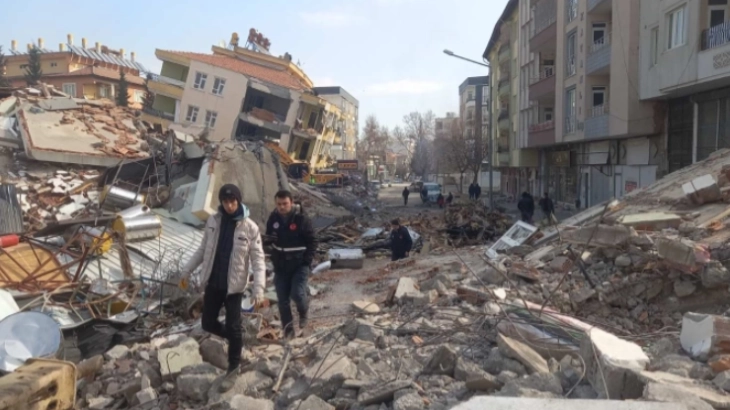1.2 million left homeless in Turkey, as last-hope rescues reported
- The devastating earthquakes in the Turkish-Syrian border region one week ago have left 1.2 million people in south-eastern Turkey homeless, Turkey's presidential office said on Monday, as probably the last survivors were found under rubble.

Beirut, 13 February 2023 (dpa/MIA) - The devastating earthquakes in the Turkish-Syrian border region one week ago have left 1.2 million people in south-eastern Turkey homeless, Turkey's presidential office said on Monday, as probably the last survivors were found under rubble.
A 13-year-old boy was carried out on a stretcher alive on Monday evening after spending 182 hours under rubble in the Hatay province of Turkey, state broadcaster TRT reported. Footage showed a volunteer holding his hand.
In the south-eastern region of Adiyaman, a 6-year-old girl was also found earlier in the day, 178 hours after the quakes, said Turkey's Defence Ministry. This is past the usual cut-off point for survival. The chances for further rescues are slim.
Survivors who are still being found now have had access to water, such as from rainwater or snow. Normally, a person can go about 72 hours without water, after which it becomes life-threatening.
Meanwhile, around 176,000 tents have been set up in the worst-hit provinces of Turkey. The disaster authority AFAD also said it had set up thousands of living containers.
Nearly 400,000 people have been evacuated from the earthquake zones, said the presidential office.
Inspections were being carried out by authorities to determine which buildings in the 10 affected provinces were still inhabitable. As of Monday afternoon, more than 7,500 buildings had already collapsed or had to be urgently demolished, said Banu Aslan, director of the construction department, according to the Anadolu news agency.
Thousands of buildings collapsed in Turkey after Monday's two massive quakes.
The situation in war-ravaged Syria is even more precarious, given that many people were already displaced within the country.
UN aid chief Martin Griffiths arrived in Aleppo on Monday, according to state news agency SANA, amid heavy criticism of delays in earthquake aid.
In Aleppo city, many are also homeless as they wait for public safety committees to inspect their buildings. At least 27 have already been demolished due to the risk of collapse.
In the Bustan al-Qasr neighbourhood, dozens erupted into joyous celebrations when the committee confirmed that residents would be allowed to move back into their five-storey building.
The hundreds who are still waiting sit along Aleppo's south-western ring road, staying either in their cars, or on the pavement next to makeshift fires.
The head of Aleppo's city council, Maad al-Madlaji, said some 13,000 families live in the 235 shelters set up by the government.
Abdo Ghorab, who spoke to dpa, was using his mattresses and bedsheets to stay on the pavement until the committee inspects his building. "We have a long road ahead of us if the building is demolished. Where will my family live?" said Ghorab, crying.
Abu Majed, a volunteer in the White Helmets rescue organization, told dpa in Idlib that people are returning to damaged homes instead of waiting for shelters to be set up, despite being warned of the risks. This is putting people's lives at risk, as the buildings have not been declared safe.
"There is [a] lack of everything and one crossing for assistance will not meet the needs of the displaced," he said angrily.
The UN said on Monday morning that six trucks were now entering into northern Syria carrying mainly tents.
Compared to the international response in neighbouring Turkey, many feel that the help is too little, too late for Syria.
The first UN relief delivery only arrived in north-western Syria on Thursday, as trucks passed from Turkey through the only remaining open border crossing at Bab al-Hawa.
Syrians are also still dealing with the horrors of the war on top of managing the aftermath of the earthquake.
The head of the war monitor Syrian Observatory for Human Rights, Rami Abdel Rahman, told dpa that despite the human tragedy and "while Syrians are still uncovering bodies from under the rubble, a Turkish drone attacked Kurdish-led areas on Sunday," killing a man in the western Ain al-Arab countryside.
One week after the catastrophic earthquakes, the number of dead continues to rise.
The total number of confirmed dead is now more than 37,500, and over 80,000 people have been injured.
In Turkey alone, the death toll has climbed to 31,643, according to Anadolu, citing AFAD.
In neighbouring Syria, at least 5,900 people are known to have died, according to World Health Organization (WHO) figures.
The extent of the quakes' damage has resulted in widespread anger.
This anger is already being addressed in Turkey, where officials issued arrest warrants for alleged negligence concerning collapsed buildings following the quakes, according to Anadolu. Over 100 arrest warrants were issued on Sunday for contractors across the country.
Turkish opposition leader Kemal Kılıçdaroğlu criticized the government for issuing a building amnesty in 2018 that allowed illegally constructed buildings in exchange for penalties after the fact.
"They turned the houses where people live into graveyards and took money for that," he said.







